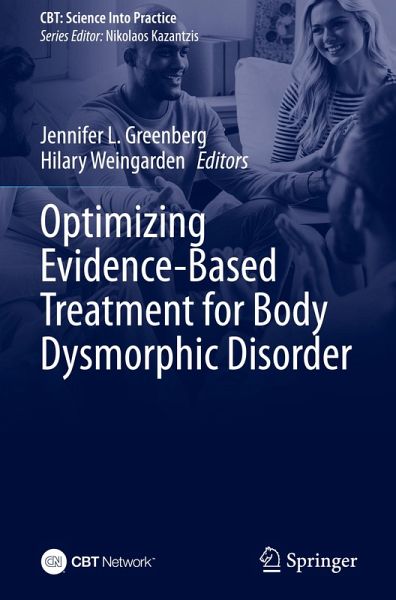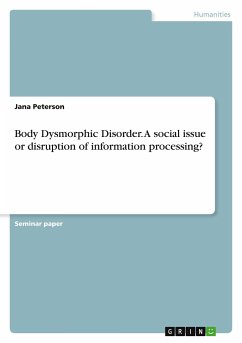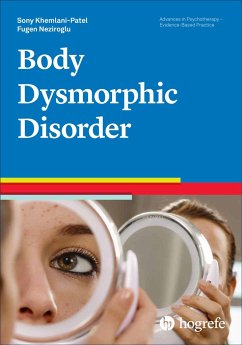
Optimizing Evidence-Based Treatment for Body Dysmorphic Disorder

PAYBACK Punkte
57 °P sammeln!
This book provides an understanding of body dysmorphic disorder (BDD), a psychiatric classification that is characterized by a preoccupation with a perceived or slight imperfection in physical appearance. This disorder lowers quality of life due to time-consuming compulsions intended to hide, fix, or check appearance concerns. Although relatively common, BDD is often not treated appropriately. When untreated, BDD is chronic, severe, and associated with substantial psychosocial impairment and morbidity, including unemployment rates of roughly 40-50%, suicide attempts in 22-28%, and lifetime hou...
This book provides an understanding of body dysmorphic disorder (BDD), a psychiatric classification that is characterized by a preoccupation with a perceived or slight imperfection in physical appearance. This disorder lowers quality of life due to time-consuming compulsions intended to hide, fix, or check appearance concerns. Although relatively common, BDD is often not treated appropriately. When untreated, BDD is chronic, severe, and associated with substantial psychosocial impairment and morbidity, including unemployment rates of roughly 40-50%, suicide attempts in 22-28%, and lifetime housebound rates of roughly 30%.This book provides an overview of body dysmorphic disorder (BDD), a psychiatric classification that is characterized by excessively impaired perception of physical attributes that can lead to acute disruption of life activities. BDD is a common disorder, but few clinicians are trained in its assessment and treatment.
This volume provides an evidence-based review of the literature for a greater understanding of the nature of the disorder. Most important, it demonstrates how to effectively assess and treat BDD. Evidence-based psychological and pharmacological treatments are presented, and importantly, ineffective treatments are also reviewed. To optimize CBT for BDD, guidelines are provided to address the most common challenges in diagnosis and treatment, including common comorbidities, differential diagnoses with similar disorders, safety management, addressing low insight or motivation, and modifying treatment for special populations including youth, patients from under-represented backgrounds, and BDD variants. Case examples throughout illuminate for practitioners the theoretical and clinical aspects of this complex problem. This an essential volume for practitioners and clinicians-in-training for gaining perspective on the disorder and its efficacious treatment.
"Integrating research and clinical wisdom of some of theworld's leading BDD experts, this book comprehensively covers the foundational as well as more nuanced approaches to treatment. Clinicians from all experience and skill levels who treat BDD will find this book to be a go-to guide to delivering high quality, evidence-based, and individually tailored care."
Jamie Feusner, MD
Professor of Psychiatry, University of Toronto
This volume provides an evidence-based review of the literature for a greater understanding of the nature of the disorder. Most important, it demonstrates how to effectively assess and treat BDD. Evidence-based psychological and pharmacological treatments are presented, and importantly, ineffective treatments are also reviewed. To optimize CBT for BDD, guidelines are provided to address the most common challenges in diagnosis and treatment, including common comorbidities, differential diagnoses with similar disorders, safety management, addressing low insight or motivation, and modifying treatment for special populations including youth, patients from under-represented backgrounds, and BDD variants. Case examples throughout illuminate for practitioners the theoretical and clinical aspects of this complex problem. This an essential volume for practitioners and clinicians-in-training for gaining perspective on the disorder and its efficacious treatment.
"Integrating research and clinical wisdom of some of theworld's leading BDD experts, this book comprehensively covers the foundational as well as more nuanced approaches to treatment. Clinicians from all experience and skill levels who treat BDD will find this book to be a go-to guide to delivering high quality, evidence-based, and individually tailored care."
Jamie Feusner, MD
Professor of Psychiatry, University of Toronto












